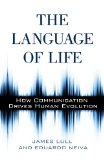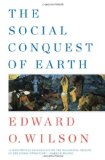May 2, 2012

The Language of Life: How Communication Drives Human Evolution by James Lull and Eduardo Neiva (Prometheus Books, 2012)
(amazon.co.uk – 22 May 2012)
Book description from the publisher:
Introducing “evolutionary communication” and a brilliant interpretation of life
Communication in its most basic form—the sending of signals and exchange of messages within and between organisms—is the heart of evolution. From the earliest life-forms to Homo sapiens, the great chain of communication drives the evolutionary process and is the indispensable component of human culture.
That is the central message of The Language of Life. In this unique perspective on both the biological evolution of life and the human development of culture, James Lull and Eduardo Neiva explore the totality of communication processes that create and sustain biological equilibrium and social stability. The authors, two international authorities on communication and culture, argue that this ubiquitous connectivity is the elemental unity of life.
Introducing a new subdiscipline—evolutionary communication—the authors analyze the core domains of life—sheer survival, sex, culture, morality, religion, and technological change—as communications phenomena. What emerges from their analysis is a brilliant interpretation of life interconnected through communication from the basic molecular level to the most sophisticated manifestations of culture.
Challenging the boundaries of conventional approaches to cultural analysis, The Language of Life presents an original and engaging view of evolution and an encouraging prognosis for our collective future.
See also: James Lull’s website
Comments (0)
- culture,human evolution,language,new books
April 19, 2012

The Creation of Inequality: How Our Prehistoric Ancestors Set the Stage for Monarchy, Slavery, and Empire by Kent Flannery and Joyce Marcus (Harvard University Press, 2012)
(amazon.co.uk)
Book description from the publisher:
Our early ancestors lived in small groups and worked actively to preserve social equality. As they created larger societies, however, inequality rose, and by 2500 BCE truly egalitarian societies were on the wane. In The Creation of Inequality, Kent Flannery and Joyce Marcus demonstrate that this development was not simply the result of population increase, food surplus, or the accumulation of valuables. Instead, inequality resulted from conscious manipulation of the unique social logic that lies at the core of every human group.
A few societies allowed talented and ambitious individuals to rise in prestige while still preventing them from becoming a hereditary elite. But many others made high rank hereditary, by manipulating debts, genealogies, and sacred lore. At certain moments in history, intense competition among leaders of high rank gave rise to despotic kingdoms and empires in the Near East, Egypt, Africa, Mexico, Peru, and the Pacific.
Drawing on their vast knowledge of both living and prehistoric social groups, Flannery and Marcus describe the changes in logic that create larger and more hierarchical societies, and they argue persuasively that many kinds of inequality can be overcome by reversing these changes, rather than by violence.
Comments (0)
- culture,human evolution,new books
April 9, 2012

The Brain: Big Bangs, Behaviors, and Beliefs by Rob DeSalle and Ian Tattersall, ill. by Patricia J. Wynne (Yale University Press, 2011)
(amazon.co.uk – 31 May 2012)
Book description from the publisher:
After several million years of jostling for ecological space, only one survivor from a host of hominid species remains standing: us. Human beings are extraordinary creatures, and it is the unprecedented human brain that makes them so. In this delightfully accessible book, the authors present the first full, step-by-step account of the evolution of the brain and nervous system.
Tapping the very latest findings in evolutionary biology, neuroscience, and molecular biology, Rob DeSalle and Ian Tattersall explain how the cognitive gulf that separates us from all other living creatures could have occurred. They discuss the development and uniqueness of human consciousness, how human and nonhuman brains work, the roles of different nerve cells, the importance of memory and language in brain functions, and much more. Our brains, they conclude, are the product of a lengthy and supremely untidy history—an evolutionary process of many zigs and zags—that has accidentally resulted in a splendidly eccentric and creative product.
Comments (0)
- cognitive science,human evolution,new books
April 1, 2012

The Social Conquest of Earth by Edward O. Wilson (Liveright, 2012)
(kindle ed.), (amazon.co.uk)
Book description from the publisher:
From the most celebrated heir to Darwin comes a groundbreaking book on evolution, the summa work of Edward O. Wilson’s legendary career.
Where did we come from? What are we? Where are we going? In a generational work of clarity and passion, one of our greatest living scientists directly addresses these three fundamental questions of religion, philosophy, and science while “overturning the famous theory that evolution naturally encourages creatures to put family first” (Discover magazine). Refashioning the story of human evolution in a work that is certain to generate headlines, Wilson draws on his remarkable knowledge of biology and social behavior to show that group selection, not kin selection, is the primary driving force of human evolution. He proves that history makes no sense without prehistory, and prehistory makes no sense without biology. Demonstrating that the sources of morality, religion, and the creative arts are fundamentally biological in nature, Wilson presents us with the clearest explanation ever produced as to the origin of the human condition and why it resulted in our domination of the Earth’s biosphere. 90 illustrations
Google books preview:
See also: Smithsonian Magazine interview, Author website
Comments (0)
- human evolution,new books
March 26, 2012

Games Primates Play: An Undercover Investigation of the Evolution and Economics of Human Relationships by Dario Maestripieri (Basic Books, 2012)
(amazon.co.uk – 26 Apr 2012)
Book description from the publisher:
Most humans don’t realize that when they exchange emails with someone, anyone, they are actually exhibiting certain unspoken rules about dominance and hierarchy. The same rules regulate the exchange of grooming behavior in rhesus macaques or chimpanzees. Interestingly, some of the major aspects of human nature have profound commonalities with our ape ancestors: the violence of war, the intensity of love, the need to live together.
While we often assume that our behavior in everyday situations reflects our unique personalities, the choices we freely make, or the influences of our environment, we rarely consider that others behave in these situations in almost the exact the same way as we do. In Games Primates Play, primatologist Dario Maestripieri examines the curious unspoken customs that govern our behavior. These patterns and customs appear to be motivated by free will, yet they are so similar from person to person, and across species, that they reveal much more than our selected choices.
Games Primates Play uncovers our evolutionary legacy: the subtle codes that govern our behavior are the result of millions of years of evolution, predating the emergence of modern humans. To understand the rules that govern primate games and our social interactions, Maestripieri arms readers with knowledge of the scientific principles that ethologists, psychologists, economists, and other behavioral scientists have discovered in their quest to unravel the complexities of behavior. As he realizes, everything from how we write emails to how we make love is determined by the legacy of our primate roots and the conditions that existed so long ago.
An idiosyncratic and witty approach to our deep and complex origins, Games Primates Play reveals the ways in which our primate nature drives so much of our lives.
See also: Author’s website
Comments (0)
- culture,human evolution,new books,psychology







